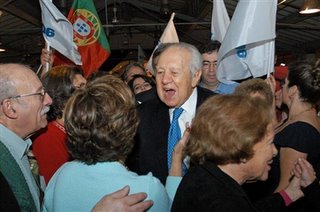Next Sunday, the portuguese people are going to vote for a new president. The stronger candidates are:
a) Cavaco Silva is the most probable winner. The last predictions say he will get 52% of the votes, which will avoid a second round. If he doesn't get the absolute majority of the votes, he will have to go for a second voting, with the second stronger candidate. He is an independent candidate (which is an advantage, since the portuguese people seem to be tired of all parties), who was prime minister from 1985-1995. He was the leader of the center right party for several years and is the candidate supported by the "right" parties. here he is, playing the portuguese guitar:

b) Manuel Alegre is according to some predictions the second most voted, while others put him as third. He is also an independent candidate, who is a member of the center left party. Before the beginning of the campaign, everybody thought his party would support him, but after Mario Soares (see below) confirmed to run for the elections, he was not supported anymore. However, he decided to run independently and the amount of votes predicted is a big victory for him and a defeat for his party. I personally admire him for his writing. Besides a politician, he is a (very good...in my opinion) writer and poet. About the lack of support from his party to the election, he wrote:
“I’m not sure in which war I am. Every day at this time, about 6 o’clock in the afternoon, I start being surrounded by troops that I don’t see.
I feel them close to me, I know they are around me, but I don’t see anyone. Only the shooting…….Sometimes they take the microphone and order me to surrender:
- You are alone, they say. You’re a lonely soldier in a war that is lost for a long time.
The problem is I don’t even know which war it is. I don’t know who put me this uniform, or who sent me here……
…..
What does it matter? Dream or not, they are here, I have to defend my square, there is no other way but this one, fight till the end, a man doesn’t surrender, it wouldn’t be nice, it would be, if you excuse me, impolite, very impolite.”

c) The older candidate (82 years old) is Mário Soares. No one believed he would still run for this election. but he did and seems to have enough strength to do it again. He was president from 1986-1996 and prime minister in the early 80s. He was also one of the important figures in the 74 revolution, which ended the dictactorship.
His campaign is being hardly criticized because he constantly attacks and provokes other candidates, especially Cavaco Silva.

Let's see what the people has to say about this on Sunday. I will let you know next week.







